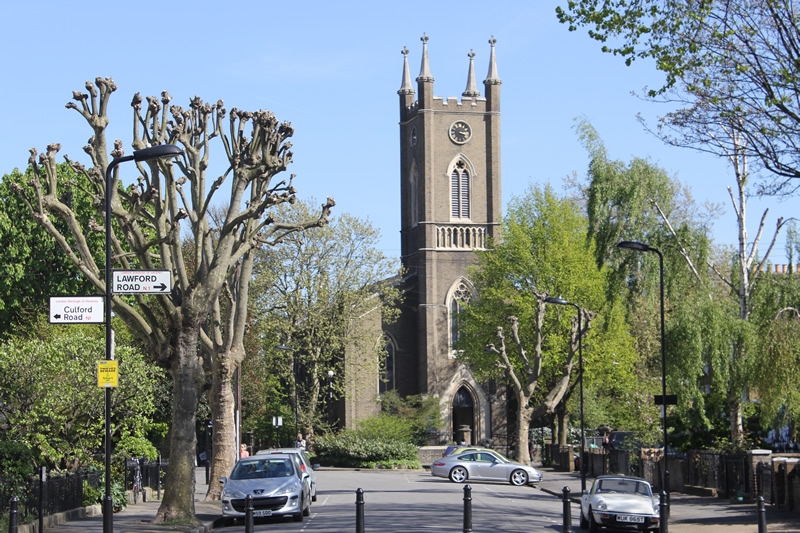Beloved St Peter’s
On Easter Sunday this year St Peter’s received some special visitors – 46 members of the Perry family, eight of whom had grown up in the old vicarage in the 1950s when their father, John Perry, was Vicar of this parish 1950-63.
There are still a handful of people here today who remember Father Perry. The rock and roll nights he ran in the crypt are a local legend. The Perry family gave me a copy of his journal about his time at St Peter’s and a wonderful double-page spread of all of them, in a women’s magazine feature on ‘Life in a Vicarage Family’.
I also found out that St Peter’s was the first church to have a full Eucharist service broadcast by ITV, on the morning of April 13th, 1958. Here are just a few extracts from Father Perry’s journal about his time at St Peter’s:
“The life of the parish was just about as dead as it could be with only twelve church members, four of them of the Blank family and two Cunninghams. The area was very run-down, with the old Flemish houses in the square falling into decay and the wartime barrage balloon still in the centre…
“The challenge of the job was enormous and exciting and as the bishop had originally said to me ‘No young man could ask for a more exciting ministry’…Within the first fortnight the treasurer had committed suicide. He was found dead in his London office. In no way was he a rogue, but in trying to keep the parish financially afloat he had got into an awful mess with the accounts’.
“On duty, of course, included worship, personal prayer, and study, preparation of sermons, attendance at group meetings as well as pastoral and teaching visits. It was the clergy at this time who lit and stoked the church coke boiler, and were at hand to set up and move furniture as parish events required. Rightly or wrongly I felt at that time that it was not fair to ask busy lay members to give up their Saturdays or weekday evenings to deal with the labouring tasks that young clergy could manage’.
‘A very significant development and ministry of St. Peter’s from the middle nineteen fifties was the arrival in Hackney and Stoke Newington of immigrants from the West Indies. People from many of the islands attached themselves to us but those from Antigua were in the majority. In the late fifties several students from West Africa also joined us finding a similar pattern of worship at St. Peter’s that they had been accustomed to at home. In the early days these immigrants were very largely male, mostly recruited for labouring work on the railways and buses. Isaiah Merchant and John Lapps from Antigua were the first to join us and both were a tremendous influence for good..
“I think I am right in remembering that there came a time when over 100 immigrants were on our church electoral roll, almost half the total membership. I like to think that perhaps I was the first Vicar who sat at the end of a double or even single bed in a grossly overcrowded four-storey tenement house, taking particulars about the man sitting up and the girl hidden under the blankets in preparation for their wedding’.
The Perry Family left St Peter’s 55 years ago.
Imagine what St Peter’s might be like in 55 years time – that’s 2073. Only those in their 20s now and younger will be likely to find out. Most of us here today will be long gone.
St Peter’s has been blessed with parish priests who stay. Since its foundation in 1841 there have only been 11 vicars – assisted of course by countless curates. And it has been blessed by families who stay for generations.
In all the flux and fury in this world, St Peter’s is needed more and more as a place of stillness.
On this day of our annual parish meeting as we gather to hear reports on the work of the church this past year and to appoint a new PCC leadership team, it is good to remember that we are all only passing through this precious place. ow we live out the body of Christ in our time will shape how those who come after us will be. As we live and minister together to those God brings to us we create a rich seam of shared memories to nurture future generations of church.
Let us pray with the words attributed to St Teresa of Avila, the 16th-century mystic:
Christ has no body now on earth but yours, no hands but yours, no feet but yours, yours are the eyes through which Christ’s compassion is to look out to the earth, yours are the feet by which He is to go about doing good and yours are the hands by which He is to bless us now.
AMEN.






